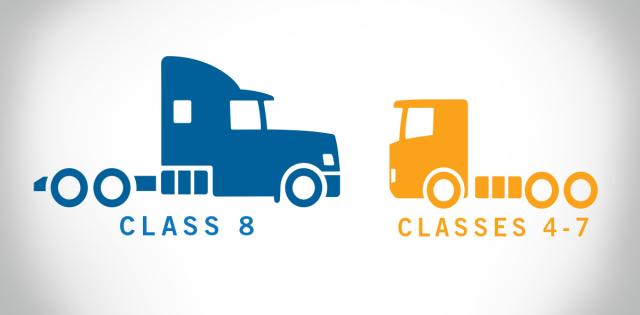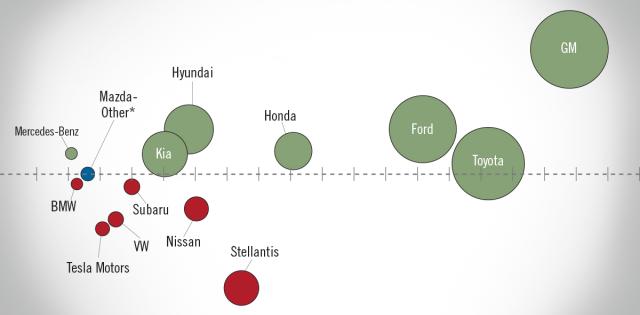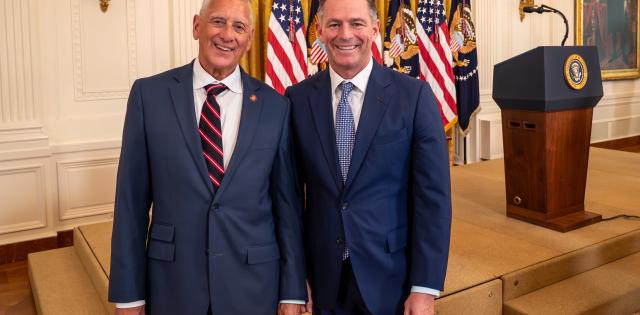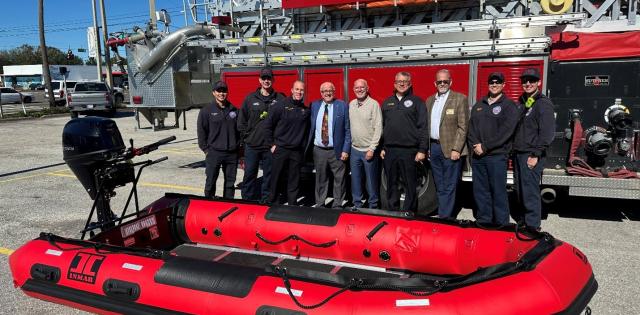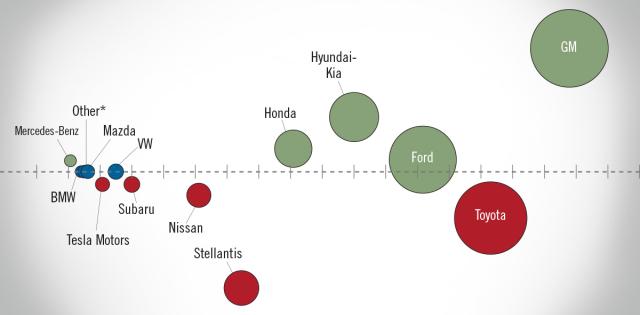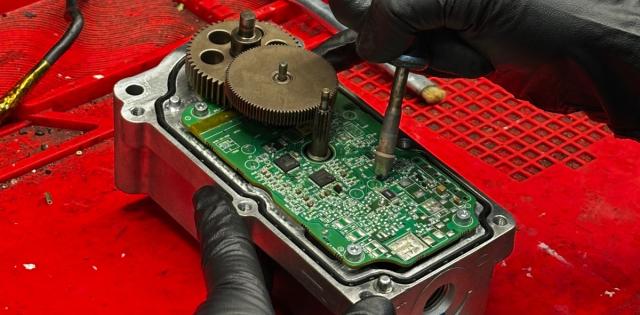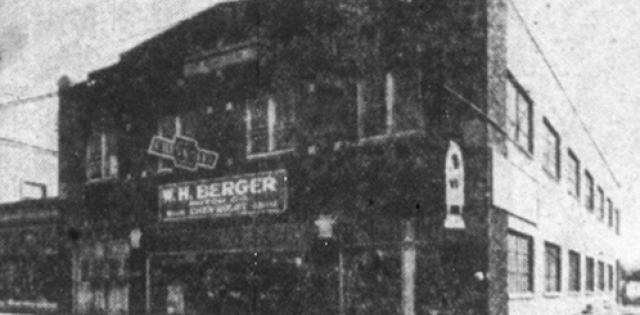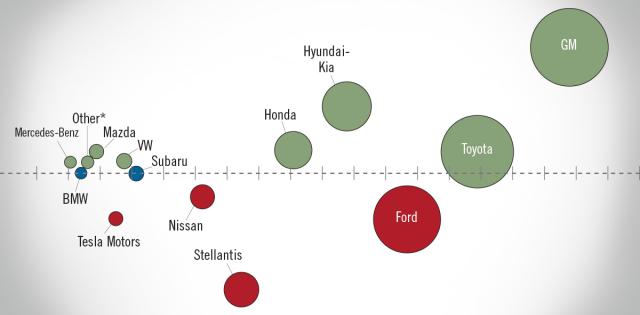Manhattan, Kansas—nicknamed by the local chamber of commerce as the “Little Apple”—may not be as glitzy or well-known as its New York counterpart. With a population of only 60,000, the Kansas Manhattan is minuscule in comparison to the 1.6 million crowding the streets of the “Big Apple.”
However, Manhattan, Kansas is the proud home of Kansas State University; Kansas’ largest music festival, the annual Country Stampede Music Festival; a 24-foot tall statue of Johnny Kaw, the pioneer of Kansas wheat; and Little Apple Cars auto dealership.
Little Apple’s owner Tom Holcombe knew that Manhattan, Kansas was a great community when he first visited in 1996 to look at a Toyota/Honda automotive dealership that was for sale.
Despite the fact that the dealership was, as Holcombe puts it, “in pretty bad shape and it didn’t have a very good reputation,” and Kansas was a good deal colder than Texarkana, Texas where Holcombe, his wife and two young daughters lived, he said he had a good feeling about the town itself. “I was driving around the town at 10 at night and I noticed that there were ladies out jogging by themselves. I thought, ‘Oh my goodness. Either they’re really brave or this is a very safe town,’” Holcombe said. “I went back to Texas, got my wife. We looked at the town and the schools and we thought, ‘What a wonderful place to raise our girls.’ And that’s exactly what it’s been.”
Pillars of Their Communities
Local dealerships like Little Apple Cars are indispensable anchors of communities across the United States. While economic development boards and local governments are working overtime to attract major corporations to their cities and counties, local dealerships like Little Apple Cars are creating good paying jobs with opportunities for advancement, contributing vast amounts of taxes to state and local coffers, and supporting local groups, charities and hospital boards.
“In every community in the United States, car dealers give back more than any other industry or profession,” Holcombe said. “It’s always bothered me that car dealers have a bad reputation, so we go overboard. I’ve yet to meet another dealer who is anything but civic minded, honest, and good people who do the right thing and give back.”
A Job Creating Engine
There are more than 8,000 dealership companies operating nearly 18,000 dealerships across the country. More than half of those companies own only one store. Another 2,000 own only two stores. So when totaling up the economic impact created by auto dealerships, the numbers are particularly staggering: more than 1.1 million direct jobs, an additional 1.18 million jobs in industries that service and do business with auto retailers.
Little Apple in Manhattan has 61 employees, including some who have been with the dealership before Holcombe bought it 22 years ago. All told, Manhattan has five new-car dealerships, Junction City, which is 20 miles southwest, has three dealerships. Other smaller towns like Wamego, 15 miles west of Manhattan, might have single point dealerships, Holcombe said. “Every community of any size usually has four or five different dealerships,” Holcombe said. “They’re a huge economic benefit to any community in terms of employment and giving back.”
In return, loyal customers like Jen FitzGerald feel a strong sense of connection to their local dealerships, which keeps FitzGerald coming back. “It’s close to home, it’s been here for like, 80 years. I’m hoping it will be here for another 80 years,” FitzGerald said about her local dealership in her MyDealership.org video. “I see people I know in the community. I’m only a couple of miles away and it’s nice to know I can just come down the street. If you patronize a local business, a smaller business, someone who’s been around a long time, you feel like you are making a difference.”
Building Up the Tax Base
Auto dealerships provide unprecedented support to state and federal governments in the form of taxes and fees collected from sales, employees, drivers, and the auto companies themselves. In fact, 15 percent of all state and local tax revenue comes from dealerships. In 2015, new-car dealers contributed $20.3 billion in state and federal income taxes. “We pay an enormous amount of property tax. Then there’s the sales tax on a vehicle. The amount we send annually to the state is huge. You’ve got a sales tax of 8.45 percent on a $20-30-40,000 vehicle. It gets to be a big number,” Holcombe said.
For Jodie Tueton, chairman of the American Truck Dealers and vice president of Kenilworth of Louisiana, contributing to the community is just part of the family business. “We’re a relatively large employer in this community,” Tueton said in her MyDealership.org video. “We offer high-paying jobs the average job here pays well in excess of $50,000 a year. I looked at some sales tax records and it looks like since the beginning of 2006, we remitted about $3.5 million in tax to both state and local government. What dealerships bring to the local and state economy is crucial.”
Honoring Teachers, Helping Military Families
What dealerships bring to their communities in terms of civic engagement and generating good will is also crucial. For example, Holcombe is involved in a variety of community activities, including serving as president of the Manhattan Chamber of Commerce, serving on the KSU Foundation, and sitting on the board at Mercy Regional Hospital for 10 years. But his proudest civic achievement is his annual Little Apple Teacher Appreciation Day.
Holcombe started his teacher appreciation program 10 years ago, “to honor my mother and the work she did. Also, because teachers are the future of our country because they teach the future of our country and they’re not recognized enough and they certainly aren’t paid enough,” Holcombe said. He holds a drawing at both his Manhattan dealership and his Capital City Nissan dealership in Topeka to give away a car to two deserving area teachers.
In early May during National Teacher Appreciation Week, Holcombe and his team empties the lot, clears out the showrooms and invites teachers and students in to enjoy cookies and soft drinks before the big drawing. Holcombe covers the cost of the car, and pays for the license, registration and tax. “All they do is drive off.” Over the last 10 years, he estimates he’s given away 19 vehicles to the tune of around $500,000. “We’ve missed a couple of years, due to construction or a tornado,” Holcombe said. “We’ve only had one teacher just turn around and trade it in.”
Another big part of the Manhattan community is nearby Fort Riley, home of the Army’s 1st Infantry Division, aka: the Big Red One. Five of Little Apple’s current sales employees are Army veterans—including a former sergeant major—and the staff at Little Apple are hands on in supporting the military families of soldiers who have been deployed. In addition to financial support to pay for education, food or housing needs, many on Little Apple’s staff—particularly the veterans donate their time and expertise. “They go out there and visit with and help, counsel the family on any issues with their vehicles, check on their vehicles and make sure they’re in good shape,” Holcombe said. “They’ll tell us about any car repairs they need, or sets of tires. whatever issue they’re having.”
Good neighbors are just good business, Holcombe said. “You do it to try to help your community. You do it primarily because it’s of interest to you and helps a group of people, and thereby helps the community. The stronger your community, the better off everyone is and the better our business is.”

